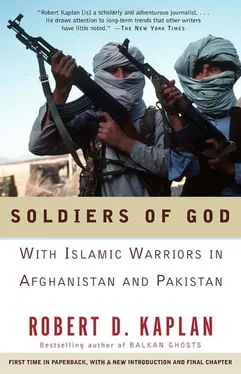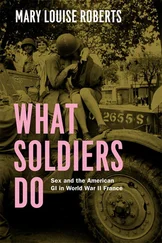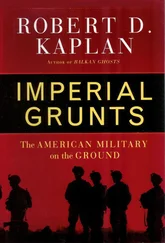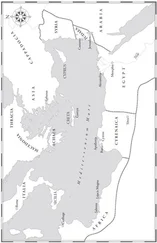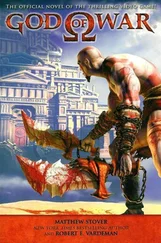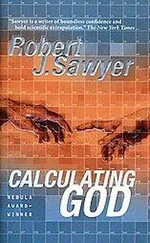But it was Dean’s, more than Green’s, that began to evoke a setting for low-grade intrigue. It was said that every room was bugged, and some even believed that the awful posters and oil paintings on the walls were really huge microphones in disguise. But that didn’t stop reporters from screaming at the top of their lungs. One night I listened to a Scandinavian writer rant and rave about why a certain mujahidin commander was secretly a Maoist. Another night, a drunken American journalist loudly accused a British colleague of being a Communist merely because she had dared to criticize the guerrillas.
The hotel staff couldn’t cope with the onslaught, and the food at Dean’s, never very good, suddenly got much worse. But the hotel drivers prospered, for the journalists and aid workers needed to be chauffeured from one sprawling refugee camp to another. The most popular driver was a fellow named Gujar, whose lugubrious manner, nervous twitch, and white beardlike stubble on his chocolate-brown head made him, along with the terrible food at Dean’s, a Peshawar “in” joke that got mentioned in nearly every recent book and article about the place.
Because of Islamic law in Pakistan, alcohol could be served only at foreign “clubs” with special liquor licenses. Given the nature of the clientele, the Peshawar bar scene was rowdy. Proud locals compared the atmosphere at the Bamboo Garden to the scene in the movie Star Wars in which space cowboys, alien monsters, and robots collide at an intergalactic truck stop. In the summer of 1987, two strung-out West German hippies at the Bamboo Garden were badgering a young Swiss woman to take heroin. She tried to ignore them, but they injected the drug into her buttocks while she talked to a friend at the bar. It turned out to be an overdose. The woman was rushed back to Europe but died en route. The bar closed before the year was over.
After that, the only place left in town to drink was the bar at the air-conditioned American Club, which was soon being mentioned in international travel magazines as one of the “great journalist bars in the world” — on par even with the bar at the Commodore Hotel in Beirut. An American friend, who for years had been writing in obscurity about Afghanistan and the Northwest Frontier at a time when nobody cared, became so intoxicated by the sudden interest in Peshawar that he innocently exclaimed to me, “Peshawar in the 1980s is one of the great place-dates of the century, like Paris in the twenties!”
Peshawar became a place where men could act out their fantasies. Koshiro Tanaka, a struggling Japanese businessman in his late forties who had a sixth-degree black belt in karate, believed that “since World War II, there has not been an honorable way for a Japanese man to die in the true samurai spirit.” So he exchanged his cubbyhole in a Tokyo trading office for a bare room and sagging jute bed in the $i.i5-a-night Khyber Hotel. This was Tanaka’s base for going out on Rambo-style combat missions with the mujahidin. He also trained hundreds of guerrillas in hand-to-hand combat. The only medical supplies he brought with him on his missions inside were three elastic tubes to use as tourniquets. “Three is enough,” he explained to me. “If all four of my limbs are cut, then I am finished.” Tanaka always carried at least two hand grenades, one for throwing at the enemy and the other for killing himself. “I can’t be taken alive, because if I’m captured — big diplomatic problem for Japan.” Tanaka’s reputation was secured when Tass, the Soviet news agency, actually taking the threat he posed seriously, reported him killed in action in September 1986. “I was in Japan at the time, training,” Tanaka said with a crazed, jack-o’-lantern grin. He was on his way back inside when I last saw him. Though he had killed quite a few Soviets with grenades and his AK-47 Kalashnikov rifle, he still had not attained his ultimate goal: killing a Russian with his bare hands.
I met an East German refugee in his late twenties who came to Pakistan “to even the score with the Russians.” Imprisoned for two years in East Berlin for trying to scale the Berlin Wall, he was eventually allowed to immigrate to West Germany. He was happy there until the letters he wrote to his father and girlfriend in East Berlin started to be returned unopened. “The Communists wouldn’t let me communicate with my family, so I decided to fight back.” Afghanistan provided him with an opportunity. He converted to Islam, learned Pukhtu, and took the nom de guerre of Ahmedjan in order to protect his family in East Germany from Communist retribution. Ahmedjan made three trips as a mujahid into the Kandahar region, participating in several battles before handing in his assault rifle to take the job of project manager for the German Humanitarian Service in Afghanistan. But he swore that he wouldn’t “withdraw from Afghanistan until the Russians do.”
No one I knew fought for money; mercenaries quickly learned that they were unwelcome in Peshawar and stopped coming, because the mujahidin didn’t understand the concept of paying someone to fight their war. Typical of the kind of person who occasionally passed through the frontier town’s revolving door was a London window cleaner whose father had given him a one-way air ticket to Peshawar. The fellow casually mentioned to anybody who would listen that he had “always wanted to kill someone.” Eventually, he went on a mission with an obscure guerrilla group, whose members let him pull the trigger of a rocket launcher aimed at a tent full of Afghan regime troops. After the explosion, in the distance he saw two bodies lying on the ground. The window cleaner then went home to London. This time his wife paid the airfare.
Fantasy, reality, and cliché carne together at Darra, an hour’s drive south of Peshawar. The dusty storefronts and jagged, biscuit-brown hills rising from behind the line of shops evoked a Disney re-creation of Dodge City, except that Darra was real, and the gunslingers were Pathans. Also, even Dodge City had some kind of law; there never was any law in Darra. The town is in a “tribal agency,” a belt of land adjacent to the Afghan border that the Pakistanis, like the British before them, have never been able to control.
In the last century, having failed to subdue the border-area Pathans, and discouraged over the number of rifles they were stealing, the British decided to help the tribesmen in a very unhelpful way. They taught the Pathans of Darra how to make their own guns and gave them the lathes to do it, knowing that the metal mined from the surrounding hills was of poor quality. This ensured that after a few hundred rounds, the barrels would expand and the guns would lose their accuracy. Today, making guns is Darra’s one and only industry. The garishly painted shops along the main street sell locally made versions of AK-47 assault rifles, as well as M-16s, Stens, Uzi submachine guns, Makarov pistols, single-action Lee-Enfields, rocket-propelled grenades, recoilless rifles, antiaircraft guns and rockets of all sizes, and much more. You can even buy a pen gun that fires a .22 caliber bullet and costs under $6. But it dropped from popularity after nine foreigners were arrested at Pakistani airports when the x-ray machines spotted the weapons-grade metal.
In one shop, grinning Pathans feverishly work the lathes and smooth the gun barrels under a sign reading, “God helps those who help themselves.” Mujahidin, blood-feuding Pathan tribesmen, and the occasional Sikh extremist from the Indian Punjab are among those who purchase Darra’s wares. Prospective customers can fire as many rounds as they want right on the streets, provided they pay for the bullets.
Darra has two smells: cordite and hashish. A shop with a sheepskin or goat’s tail hanging outside indicates a place where drugs are sold. There are plenty of those shops at the north end of town. A kilo of brown heroin sells for under $100 in Darra; the New York City street value would be around $1 million. The going price for a credit card-size brick of opium is $4 in Darra. At dusk, the shops are bolted shut because of the risk of brigands. I never met a relief worker or journalist who hadn’t visited the town at least once. It’s what the Northwest Frontier is all about.
Читать дальше
